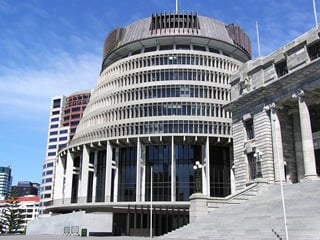New Zealand’s government announced plans to substantially increase infrastructure spending to help sustain economic growth and cope with a swelling population

(Bloomberg) -- New Zealand’s government announced plans to substantially increase infrastructure spending to help sustain economic growth and cope with a swelling population.
In its May 25 budget, the government will allocate NZ$11 billion ($7.6 billion) in additional spending on infrastructure like schools, roads, hospitals and housing between 2017 and 2020, Finance Minister Steven Joyce said in a speech in Wellington Thursday. When added to already-planned investments, a total of around NZ$23 billion would be spent over the four-year period, representing “the biggest addition to the government’s capital stock in decades,” he said.
New Zealand’s economy is among the fastest-growing in the developed world, expanding at around 3 percent a year, and the government predicts rising budget surpluses. Growth is being driven in part by record immigration and fewer New Zealanders seeking work abroad, which is straining infrastructure.
"As a country we are now growing a bit like South-East Queensland or Sydney, when in the past we were used to growing in fits and starts," Joyce said. "That’s great because we used to send our kids to South-East Queensland and Sydney to work, and now they come back here.”
Debt Reduction
Details of the first tranche of spending would be unveiled in the budget, and Joyce said the government wants to make greater use of public-private partnerships and joint ventures to boost infrastructure further.
“Steven Joyce has belatedly come to the realization that everyone else has a long time ago, that this country needs an urgent and enormous catch-up from nine years of under investment by this government,” said Grant Robertson, finance spokesman for the opposition Labour Party.
The government will seek a rare fourth term in office at the Sept. 23 general election, and next month’s budget will allow Joyce to signal fiscal priorities for the campaign. He said today he may alter income tax thresholds to reduce the burden on low and middle income earners, but would not cut tax rates.
Joyce also announced a new debt-reduction target, saying it will improve New Zealand’s ability to cope with shocks ahead.
The government will aim to cut net debt to 10-15 percent of gross domestic product by 2025, from an estimated 24.3 percent at June 30 this year. Its current target is to reduce net debt to 20 percent of GDP by 2020.
Joyce said the government borrowed heavily to help the country through the global financial crisis and a devastating earthquake in Christchurch in 2011.
"Shocks can come along at any time, and sometimes they come in pairs,” he said. "We are a geologically young country, and we are also a small country in an often turbulent world -- so there are plenty of shocks ahead of us."
In its May 25 budget, the government will allocate NZ$11 billion ($7.6 billion) in additional spending on infrastructure like schools, roads, hospitals and housing between 2017 and 2020, Finance Minister Steven Joyce said in a speech in Wellington Thursday. When added to already-planned investments, a total of around NZ$23 billion would be spent over the four-year period, representing “the biggest addition to the government’s capital stock in decades,” he said.
New Zealand’s economy is among the fastest-growing in the developed world, expanding at around 3 percent a year, and the government predicts rising budget surpluses. Growth is being driven in part by record immigration and fewer New Zealanders seeking work abroad, which is straining infrastructure.
"As a country we are now growing a bit like South-East Queensland or Sydney, when in the past we were used to growing in fits and starts," Joyce said. "That’s great because we used to send our kids to South-East Queensland and Sydney to work, and now they come back here.”
Debt Reduction
Details of the first tranche of spending would be unveiled in the budget, and Joyce said the government wants to make greater use of public-private partnerships and joint ventures to boost infrastructure further.
“Steven Joyce has belatedly come to the realization that everyone else has a long time ago, that this country needs an urgent and enormous catch-up from nine years of under investment by this government,” said Grant Robertson, finance spokesman for the opposition Labour Party.
The government will seek a rare fourth term in office at the Sept. 23 general election, and next month’s budget will allow Joyce to signal fiscal priorities for the campaign. He said today he may alter income tax thresholds to reduce the burden on low and middle income earners, but would not cut tax rates.
Joyce also announced a new debt-reduction target, saying it will improve New Zealand’s ability to cope with shocks ahead.
The government will aim to cut net debt to 10-15 percent of gross domestic product by 2025, from an estimated 24.3 percent at June 30 this year. Its current target is to reduce net debt to 20 percent of GDP by 2020.
Joyce said the government borrowed heavily to help the country through the global financial crisis and a devastating earthquake in Christchurch in 2011.
"Shocks can come along at any time, and sometimes they come in pairs,” he said. "We are a geologically young country, and we are also a small country in an often turbulent world -- so there are plenty of shocks ahead of us."



